A
Auto Express
Guest
The new Ford Fiesta isn’t exactly a design revolution over the previous model, and that’s partly because the car uses the same Ford ‘Global B’ platform as before. That means lots of the unseen parts are the same, keeping the proportions broadly similar to before - and, therefore, the design. A familiar trapezoidal grille remains on the front, plus there’s a set of swept-back headlights and a rising shoulder line just like before.
Still, at the back there is quite a change, as the larger, more horizontal taillights and new tailgate give the rear a different stance on the road. The car is longer and wider than before, which helps with interior space, but it also means the new Ford supermini does have a new shape, even though it takes more than a glance to realise.
The bigger change to the Fiesta’s design is on the inside, though. There are fewer hard, scratchy plastics in there, replaced with soft-touch materials and a newer, more modern layout. A large, tablet-style touchscreen sits on top of the dash, just like in the Citroen C3 and Hyundai i20, with the heater controls placed lower down. It means the Fiesta is a far cry from the previous version covered in buttons and switches, and it feels more upmarket as a result. The SEAT Ibiza still wins for material quality and simple design, though.
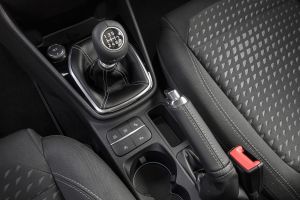
Ford Fiesta - interior detail
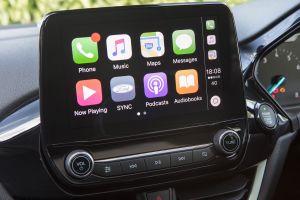
Spend another £300 for and you get a ten speaker Bang & Olufsen stereo.
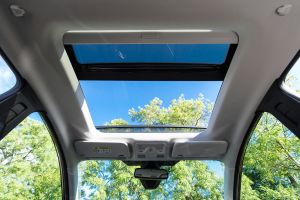
Ford Fiesta - panoramic roof
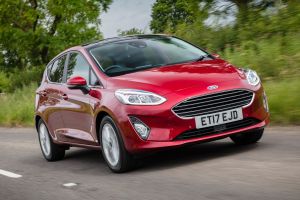
Ford Fiesta - front red
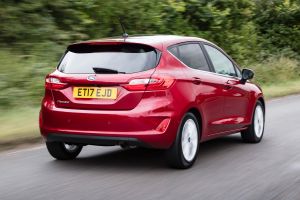
Ford Fiesta - rear red
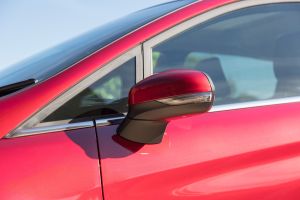
Ford Fiesta - wing mirror red
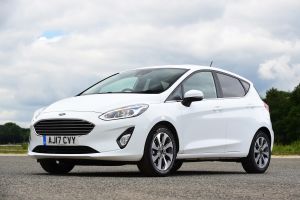
Ford Fiesta - front static
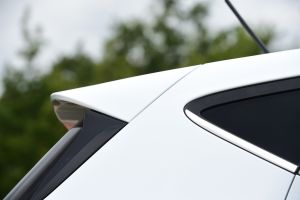
Ford Fiesta - profile
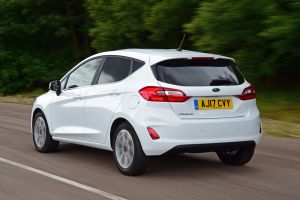
Ford Fiesta - rear
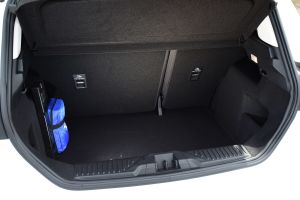
Ford Fiesta - boot
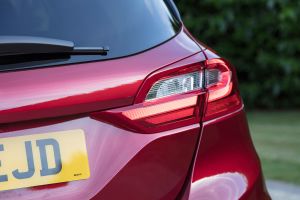
Ford Fiesta - rear detail
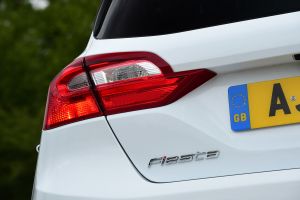
Our Choice: Ford Fiesta Zetec 1.0 EcoBoost (100PS).
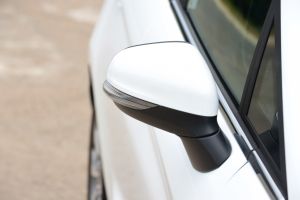
Ford Fiesta - wing mirror
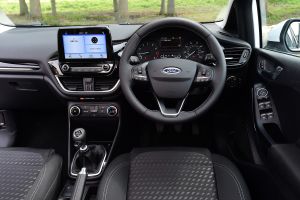
The interior is a big change with upmarket materials and a more modern layout.
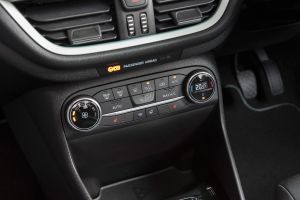
The cabin has ergonomically placed controls, while soft-touch materials replace hard plastic panels.
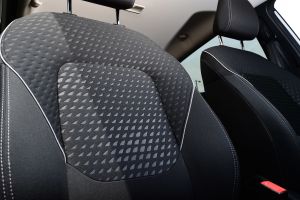
Ford Fiesta - front seat detail
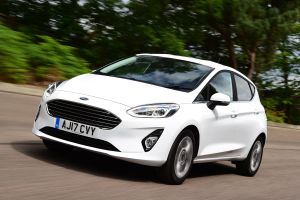
Ford has improved the Fiesta to keep it on top of the UK’s car sales charts.
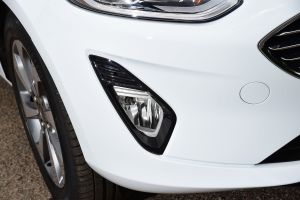
Ford Fiesta - fog light
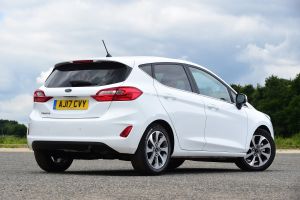
The changes made to rear end styling give it a different stance on the road.
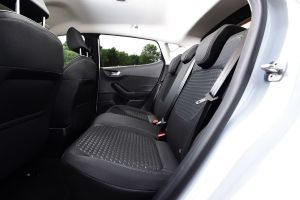
It feels a little bit more spacious inside with decent space in the back seats. While the boot is slightly larger too, with a wider opening than before.
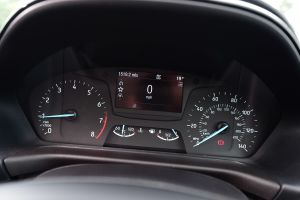
Ford Fiesta - dials
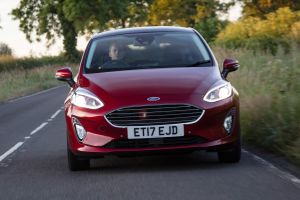
The design change is evolutionary as the car used the same platform as before.
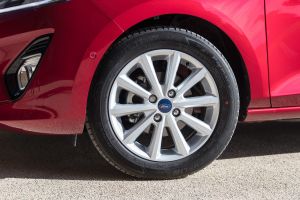
Ford Fiesta - wheel
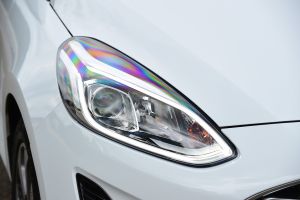
Ford Fiesta - front light
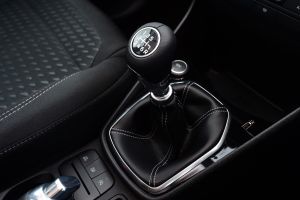
Ford Fiesta - transmission
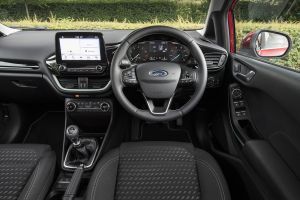
You get to choose from a basic 6.5-inch system and an 8-inch running Ford’s SYNC3 software.
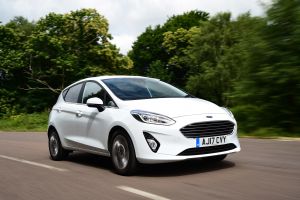
Ford Fiesta - front action
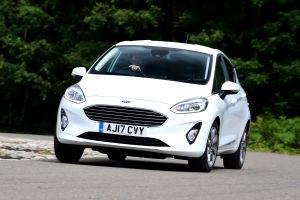
Ford Fiesta - front cornering
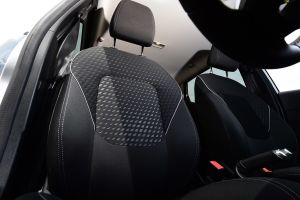
Ford Fiesta - front seat
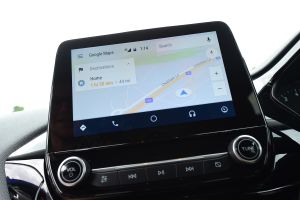
Ford Fiesta - sat-nav
Entry-level Trend cars feature 16-inch alloys as standard, plus air-conditioning, Bluetooth and a 8.0-inch touchscreen. The expected best-selling Titanium model adds rear parking sensors, cruise control and Ford’s SYNC 3 software with sat-nav. Move up to ST-Line X and you get 18-inch alloys, partial leather-trimmed sports seats and a B&O Premium audio system.
Range-topping Vignale models are positioned to rival premium superminis, and get 17-inch alloys, heated leather seats and unique interior/exterior styling accents - but as these models cost a lot to buy and won’t hold their value very well; we’d stick to a Titanium model if you want more toys.

Ford Fiesta - interior detail

Spend another £300 for and you get a ten speaker Bang & Olufsen stereo.

Ford Fiesta - panoramic roof

Ford Fiesta - front red

Ford Fiesta - rear red

Ford Fiesta - wing mirror red

Ford Fiesta - front static

Ford Fiesta - profile

Ford Fiesta - rear

Ford Fiesta - boot

Ford Fiesta - rear detail

Our Choice: Ford Fiesta Zetec 1.0 EcoBoost (100PS).

Ford Fiesta - wing mirror

The interior is a big change with upmarket materials and a more modern layout.

The cabin has ergonomically placed controls, while soft-touch materials replace hard plastic panels.

Ford Fiesta - front seat detail

Ford has improved the Fiesta to keep it on top of the UK’s car sales charts.

Ford Fiesta - fog light

The changes made to rear end styling give it a different stance on the road.

It feels a little bit more spacious inside with decent space in the back seats. While the boot is slightly larger too, with a wider opening than before.

Ford Fiesta - dials

The design change is evolutionary as the car used the same platform as before.

Ford Fiesta - wheel

Ford Fiesta - front light

Ford Fiesta - transmission

You get to choose from a basic 6.5-inch system and an 8-inch running Ford’s SYNC3 software.

Ford Fiesta - front action

Ford Fiesta - front cornering

Ford Fiesta - front seat

Ford Fiesta - sat-nav
All models now come with an 8.0-inch touchscreen, although Trend versions have to make do without Ford’s SYNC 3 infotainment system.The latest version of the tech adds Apple CarPlay and Android Auto functionality. The graphics are crisp and it’s pretty easy to use, but there are only a few physical buttons to make navigating easier when you’re on the move.
Higher-spec models add a Bang & Olufsen stereo that has eight speakers and a subwoofer for improved audio. It’s there to compete with similar systems in rivals: the Nissan Micra has a Bose set-up, while Beats audio features on a number of other supermini rivals.
Continue reading...
Still, at the back there is quite a change, as the larger, more horizontal taillights and new tailgate give the rear a different stance on the road. The car is longer and wider than before, which helps with interior space, but it also means the new Ford supermini does have a new shape, even though it takes more than a glance to realise.
- SEE MORE Long-term test review: Ford Fiesta
The bigger change to the Fiesta’s design is on the inside, though. There are fewer hard, scratchy plastics in there, replaced with soft-touch materials and a newer, more modern layout. A large, tablet-style touchscreen sits on top of the dash, just like in the Citroen C3 and Hyundai i20, with the heater controls placed lower down. It means the Fiesta is a far cry from the previous version covered in buttons and switches, and it feels more upmarket as a result. The SEAT Ibiza still wins for material quality and simple design, though.

Ford Fiesta - interior detail

Spend another £300 for and you get a ten speaker Bang & Olufsen stereo.

Ford Fiesta - panoramic roof

Ford Fiesta - front red

Ford Fiesta - rear red

Ford Fiesta - wing mirror red

Ford Fiesta - front static

Ford Fiesta - profile

Ford Fiesta - rear

Ford Fiesta - boot

Ford Fiesta - rear detail

Our Choice: Ford Fiesta Zetec 1.0 EcoBoost (100PS).

Ford Fiesta - wing mirror

The interior is a big change with upmarket materials and a more modern layout.

The cabin has ergonomically placed controls, while soft-touch materials replace hard plastic panels.

Ford Fiesta - front seat detail

Ford has improved the Fiesta to keep it on top of the UK’s car sales charts.

Ford Fiesta - fog light

The changes made to rear end styling give it a different stance on the road.

It feels a little bit more spacious inside with decent space in the back seats. While the boot is slightly larger too, with a wider opening than before.

Ford Fiesta - dials

The design change is evolutionary as the car used the same platform as before.

Ford Fiesta - wheel

Ford Fiesta - front light

Ford Fiesta - transmission

You get to choose from a basic 6.5-inch system and an 8-inch running Ford’s SYNC3 software.

Ford Fiesta - front action

Ford Fiesta - front cornering

Ford Fiesta - front seat

Ford Fiesta - sat-nav
Entry-level Trend cars feature 16-inch alloys as standard, plus air-conditioning, Bluetooth and a 8.0-inch touchscreen. The expected best-selling Titanium model adds rear parking sensors, cruise control and Ford’s SYNC 3 software with sat-nav. Move up to ST-Line X and you get 18-inch alloys, partial leather-trimmed sports seats and a B&O Premium audio system.
Range-topping Vignale models are positioned to rival premium superminis, and get 17-inch alloys, heated leather seats and unique interior/exterior styling accents - but as these models cost a lot to buy and won’t hold their value very well; we’d stick to a Titanium model if you want more toys.

Ford Fiesta - interior detail

Spend another £300 for and you get a ten speaker Bang & Olufsen stereo.

Ford Fiesta - panoramic roof

Ford Fiesta - front red

Ford Fiesta - rear red

Ford Fiesta - wing mirror red

Ford Fiesta - front static

Ford Fiesta - profile

Ford Fiesta - rear

Ford Fiesta - boot

Ford Fiesta - rear detail

Our Choice: Ford Fiesta Zetec 1.0 EcoBoost (100PS).

Ford Fiesta - wing mirror

The interior is a big change with upmarket materials and a more modern layout.

The cabin has ergonomically placed controls, while soft-touch materials replace hard plastic panels.

Ford Fiesta - front seat detail

Ford has improved the Fiesta to keep it on top of the UK’s car sales charts.

Ford Fiesta - fog light

The changes made to rear end styling give it a different stance on the road.

It feels a little bit more spacious inside with decent space in the back seats. While the boot is slightly larger too, with a wider opening than before.

Ford Fiesta - dials

The design change is evolutionary as the car used the same platform as before.

Ford Fiesta - wheel

Ford Fiesta - front light

Ford Fiesta - transmission

You get to choose from a basic 6.5-inch system and an 8-inch running Ford’s SYNC3 software.

Ford Fiesta - front action

Ford Fiesta - front cornering

Ford Fiesta - front seat

Ford Fiesta - sat-nav
Sat-nav, stereo and infotainment
All models now come with an 8.0-inch touchscreen, although Trend versions have to make do without Ford’s SYNC 3 infotainment system.The latest version of the tech adds Apple CarPlay and Android Auto functionality. The graphics are crisp and it’s pretty easy to use, but there are only a few physical buttons to make navigating easier when you’re on the move.
Higher-spec models add a Bang & Olufsen stereo that has eight speakers and a subwoofer for improved audio. It’s there to compete with similar systems in rivals: the Nissan Micra has a Bose set-up, while Beats audio features on a number of other supermini rivals.
Continue reading...
